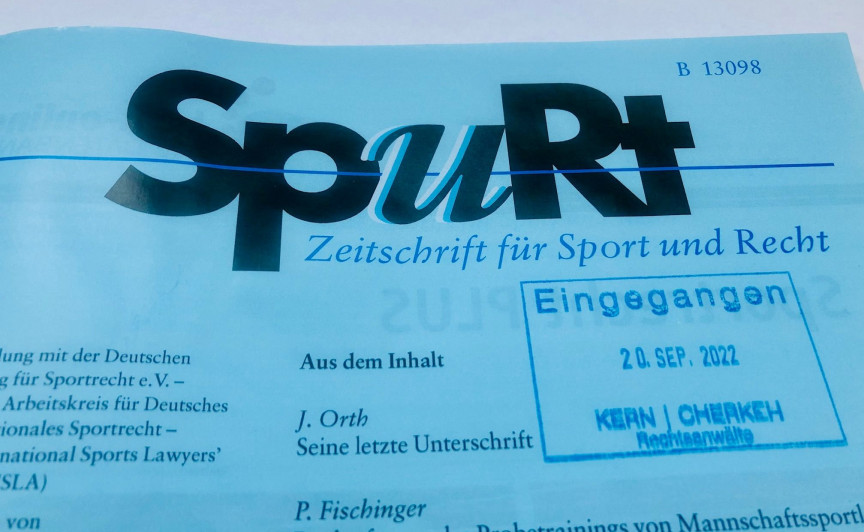In the current issue of the journal "SpuRt - Zeitschrift für Sport und Recht" (issue 5/2022, p. 351 f.) there is a review by Prof. Cherkeh of the dissertation by Leonie Axer (2021) entitled
„Beweisanforderungen in der internationalen Sportschiedsgerichtsbarkeit vor dem Court of Arbitration for Sport (CAS).“
("Evidentiary requirements in international sports arbitration before the Court of Arbitration for Sport (CAS).")
From the review:
"Indeed, the CAS is by no means a purely appellate instance, as arbitral tribunals may, pursuant to Art. R57 para. 1 of the CAS Code, the arbitral tribunals can carry out a full review of all factual as well as all legal aspects. This "de novo" competence of the arbitral tribunal repeatedly leads to formal errors of the association proceedings being cured in the arbitral proceedings, but also to the CAS arbitral tribunal making a new decision which completely replaces previous association decisions or, for example, the award of the DIS Court of Arbitration for Sport. (...). The fact that such a "de novo" procedure at the CAS and especially CAS appeal proceedings in doping disputes are associated with an exorbitant cost risk for athletes and thus do not comply with the constitutional requirements of effective legal protection and procedural equality of arms is a serious effect already discussed elsewhere, which moreover leads to the invalidity of arbitration agreements that provide for a CAS appeal procedure (on this Cherkeh / Vieweg, SpuRt 2021, 250 et seq.).
In principle, Axer welcomes the provision of Art. R57 para. 2 of the CAS Code, which came into force on 1 January 2019 and which allows a public hearing to be held before the CAS at the request of a natural person ("should be held"). However, Axer rightly criticises the numerous restrictions to be read into this new provision, which leave it to the discretion of the CAS panel whether or not to grant the request. According to Axer, why should it be possible to deny a request for a public hearing if the proceedings are exclusively related to questions of law? And why should the public hearing be denied if a public hearing had already taken place in the first instance? Axer is quite right to criticise this.
Especially since it is common practice and characteristic of "de novo" proceedings that new and / or additional witnesses and experts are heard in the appeal instance before the CAS. The holding of a public hearing may therefore not be left to the discretion of the CAS panel even in these constellations. The same applies to the CAS panel's assessment of whether proceedings relate exclusively to questions of law. For this assessment (question of fact or question of law) may also be highly controversial across both instances and may even constitute the core of the dispute.
In its recent decision of 3. 6. 2022, the Federal Constitutional Court (1 BvR 2103/16) assumed the invalidity of the arbitration agreement to the CAS due to lack of publicity, because Claudia Pechstein's constitutionally guaranteed right to justice was violated. Whether the new version of Art. R57 of the CAS Code discussed by Axer guarantees the right to a public hearing was explicitly left open by the BVerfG because this (new) provision in the CAS Code did not concern the Pechstein case.
With the justifiably formulated criticism by Axer and the further aspects still cited here, one will be able to assume with the new version of Art. R57, however, it can be assumed that this provision, too, neither satisfies the guarantees of Art. 6 (1) ECHR nor the corresponding requirements of the right of the person concerned to have his or her case heard."

